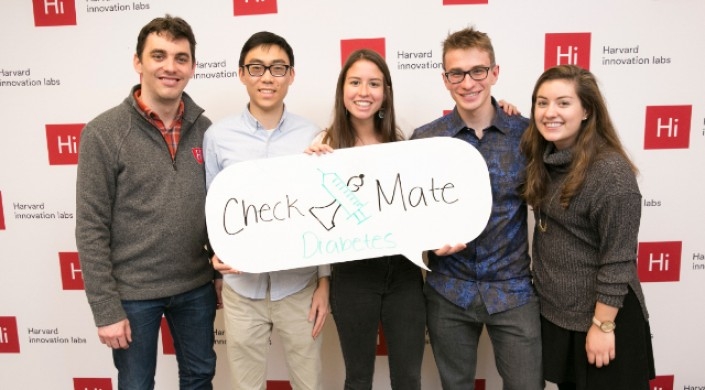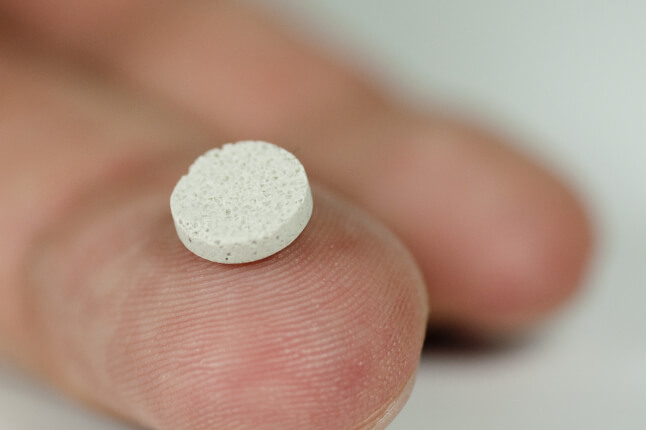News
The Checkmate Diabetes team (from left) Michael Heisterkamp, Huey Shih, Emi Gonzalez, Filip Michalsky, and Tara Markert. (Photo provided by Emi Gonzalez)
Diabetes is the seventh leading cause of death in the U.S., and nearly 10 percent of the population suffers from this chronic disease, according to the Centers for Disease Control and Prevention.
Yet despite the disease’s prevalence and potentially deadly consequences, studies show that nearly 50 percent of people with diabetes don’t adhere to recommended self-care and treatment regimens.
Harvard students have set out to change that by creating a social platform to motivate people with diabetes to keep up with glucose monitoring, diet, exercise, and other healthy habits.
Their startup, Checkmate Diabetes, grew out of the Harvard College course Glucose: from Molecules to Society (SCRB 175), explained co-founder Emi Gonzalez, A.B. ’18, a molecular and cellular biology concentrator. After hearing from amputees and individuals who lost their vision due to poor diabetes management, the class embarked on an open-ended project to find a solution.
“A lot of people who have lost limbs or their vision because of diabetes, by the time they realized they needed to keep up with their management everyday, it was too late,” she said. “We want to raise awareness so others don’t suffer the same fate.”
So Gonzalez gathered a team and applied to the Harvard Innovation Labs to turn their idea into a reality. They are developing a mobile app that uses gamification and community-building to motivate people with diabetes, explained Filip Michalsky, M.E. ’19, a student in the computational science and engineering master’s program offered by the Institute for Applied Computational Science (IACS) at the Harvard John A. Paulson School of Engineering and Applied Sciences (SEAS).
In the current beta version, Checkmate users track blood sugar levels and receive an abstracted score based mostly on how often they check. Seeing their ranking compared to others’ scores is a motivating force, Michalsky said.
“When I go running in the morning, I run with a group of people,” he said. “Just knowing there is someone out there waiting for me and watching what I am doing, someone who is holding me accountable, gives me the extra motivation I need to get out of bed. We are trying to apply that same concept to diabetes management.”
In addition to the competitive aspect of the app, Checkmate will offer tangible rewards for users with the highest scores; prizes will include diabetes test strips, test kits, and gym passes.
The app also builds community. Checkmate’s location-based system connects users to other people with diabetes who live nearby, or are in the same age group, encouraging the formation of support groups.
The next version will include a more robust score, incorporating how well a user adheres to dietary restrictions and an exercise regimen. Those additions will help Checkmate stay relevant in the future, as more patients begin using blood glucose monitoring systems.
The development team is also incorporating machine learning, enabling the app to learn what information is most likely to motivate a specific user. Maybe seeing higher scores inspires someone to strive harder, or perhaps seeing users with similar scores, who face relatable struggles, is more motivating, Michalsky said.
To help bring Checkmate to life, Gonzalez enrolled in the SEAS course Startup R&D (ES 95r), taught by Paul Bottino, Executive Director of Innovation Education. That course has offered indispensable guidance, while connecting Gonzalez to industry and entrepreneurship experts who helped the team overcome complex challenges.
The biggest hurdles involve gathering enough user feedback, as well as finding the right communities to target, Gonzalez said. The team is developing features and gathering funding in the hopes of releasing a more robust version of the free app this summer or fall.
Looking farther into the future, the app’s gamification and machine learning elements could be applied to other diseases, like hypertension, or to motivate patients to take medications on time, Gonzalez said.
While that potential future is exciting, they are focusing on diabetes for now.
“We are still trying to decide what new features will be the best to implement,” Michalsky said. “We have some hypotheses, and now are validating those hypotheses. In entrepreneurship, we learn that you can’t just build a full product, come out of your basement, and start selling it without knowing if you will have a paying customer.”
Gathering user feedback has been eye-opening for Gonzalez, who understood the physiology of diabetes from her background as a molecular and cellular biologist, but has learned a great deal about living with the disease on a day-to-day basis.
Hearing patients’ tragic stories motivates her to press through the difficulties and uncertainties involved in launching a startup.
“This epidemic is going to continue to grow. By 2050, about one third of individuals will have diabetes. Our goal is to either stop that before it happens, or help people once they are already there to keep it from getting worse,” she said. “Checkmate has the potential to really make a difference.”
Topics: Entrepreneurship, Health / Medicine
Cutting-edge science delivered direct to your inbox.
Join the Harvard SEAS mailing list.
Press Contact
Adam Zewe | 617-496-5878 | azewe@seas.harvard.edu



